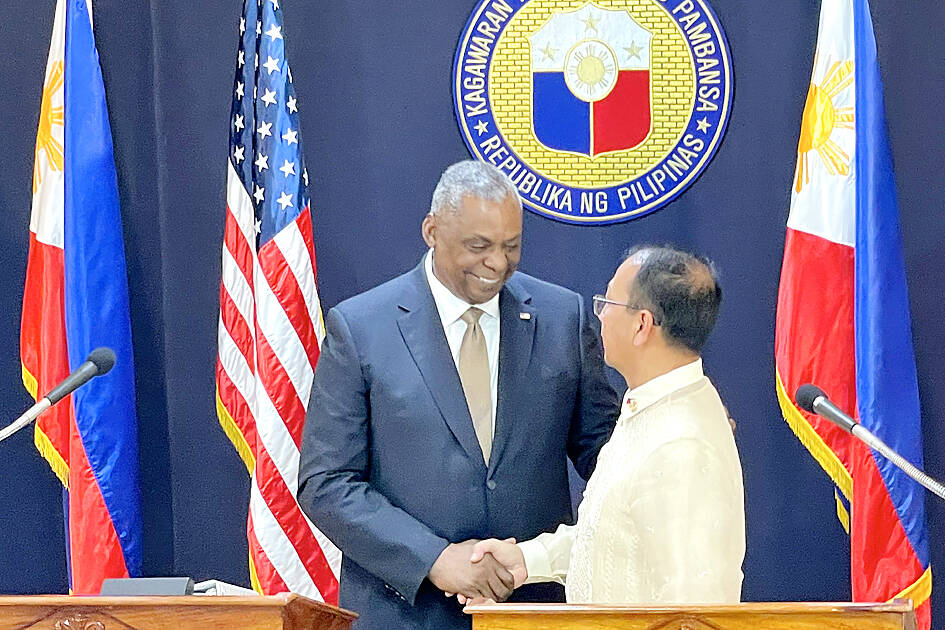The US and the Philippines yesterday announced an agreement to expand the US’ military presence in the Southeast Asian country, where forces would be granted access to four more Philippine military camps, effectively providing them new ground to ramp up deterrence against China’s increasingly aggressive actions toward Taiwan and in the disputed South China Sea.
The agreement between the longtime treaty allies under a 2014 defense pact was made public during the visit of US Secretary of Defense Lloyd Austin.
The allied nations also said in a joint statement that “substantial” progress has been made in projects at five Philippine military camps, where US military personnel were earlier granted access by Philippine officials under the Enhanced Defense Cooperation Agreement (EDCA), adding that construction of US facilities has begun.

Photo: EPA-EFE
Austin briefly met with Philippine President Ferdinand Marcos Jr, who has taken steps to nurture closer ties with Washington since taking office in June, and was to later meet with Philippine Secretary of National Defense Carlito Galvez Jr to discuss Washington’s plan to expand its military presence in the country.
“The EDCA is a key pillar of the US-Philippines alliance, which supports combined training, exercises and interoperability between our forces,” the joint statement said.
“The addition of these new EDCA locations will allow more rapid support for humanitarian and climate-related disasters in the Philippines, and respond to other shared challenges,” it said.
The location of the four camps where US forces are to construct barracks, warehouses and hangars was not disclosed, but Philippine military and defense officials n November last year said the US had sought access to camps in the northern Philippine region of Luzon.
Two additional camps where the US reportedly want access are near mainland Luzon’s northern tip, across a sea border from Taiwan, close to the Taiwan Strait and southern China.
Other local camps that are to reportedly host US forces lie along the country’s western coast, which faces the South China Sea.
China and the Philippines — along with Taiwan, Brunei, Malaysia and Vietnam — have been locked in increasingly tense territorial disputes over the busy and resource-rich South China Sea.
Washington lays no claims in the strategic waters, but has deployed its warships and fighter aircraft for patrols that it has said promote freedom of navigation and the rule of law, but have been criticized by Beijing.
“The Philippine-US alliance has stood the test of time and remains ironclad,” the statement said. “We look forward to the opportunities these new sites will create to expand our cooperation together.”
The Philippines, Washington’s oldest treaty ally in Asia, used to host two of the largest US Navy and Air Force bases outside the US mainland. The bases were shut in the early 1990s after the Philippine Senate rejected an extension, but US forces returned for large-scale combat exercises with Philippine troops under a 1999 Visiting Forces Agreement and the EDCA.
The Philippine Constitution prohibits the permanent basing of foreign troops and their involvement in local combat. The EDCA defense pact allows visiting US forces to indefinitely stay in rotating batches within designated Philippine camps with defense equipment exlucing nuclear weapons.

The CIA has a message for Chinese government officials worried about their place in Chinese President Xi Jinping’s (習近平) government: Come work with us. The agency released two Mandarin-language videos on social media on Thursday inviting disgruntled officials to contact the CIA. The recruitment videos posted on YouTube and X racked up more than 5 million views combined in their first day. The outreach comes as CIA Director John Ratcliffe has vowed to boost the agency’s use of intelligence from human sources and its focus on China, which has recently targeted US officials with its own espionage operations. The videos are “aimed at

STEADFAST FRIEND: The bills encourage increased Taiwan-US engagement and address China’s distortion of UN Resolution 2758 to isolate Taiwan internationally The Presidential Office yesterday thanked the US House of Representatives for unanimously passing two Taiwan-related bills highlighting its solid support for Taiwan’s democracy and global participation, and for deepening bilateral relations. One of the bills, the Taiwan Assurance Implementation Act, requires the US Department of State to periodically review its guidelines for engagement with Taiwan, and report to the US Congress on the guidelines and plans to lift self-imposed limitations on US-Taiwan engagement. The other bill is the Taiwan International Solidarity Act, which clarifies that UN Resolution 2758 does not address the issue of the representation of Taiwan or its people in

US Indo-Pacific Commander Admiral Samuel Paparo on Friday expressed concern over the rate at which China is diversifying its military exercises, the Financial Times (FT) reported on Saturday. “The rates of change on the depth and breadth of their exercises is the one non-linear effect that I’ve seen in the last year that wakes me up at night or keeps me up at night,” Paparo was quoted by FT as saying while attending the annual Sedona Forum at the McCain Institute in Arizona. Paparo also expressed concern over the speed with which China was expanding its military. While the US

SHIFT: Taiwan’s better-than-expected first-quarter GDP and signs of weakness in the US have driven global capital back to emerging markets, the central bank head said The central bank yesterday blamed market speculation for the steep rise in the local currency, and urged exporters and financial institutions to stay calm and stop panic sell-offs to avoid hurting their own profitability. The nation’s top monetary policymaker said that it would step in, if necessary, to maintain order and stability in the foreign exchange market. The remarks came as the NT dollar yesterday closed up NT$0.919 to NT$30.145 against the US dollar in Taipei trading, after rising as high as NT$29.59 in intraday trading. The local currency has surged 5.85 percent against the greenback over the past two sessions, central